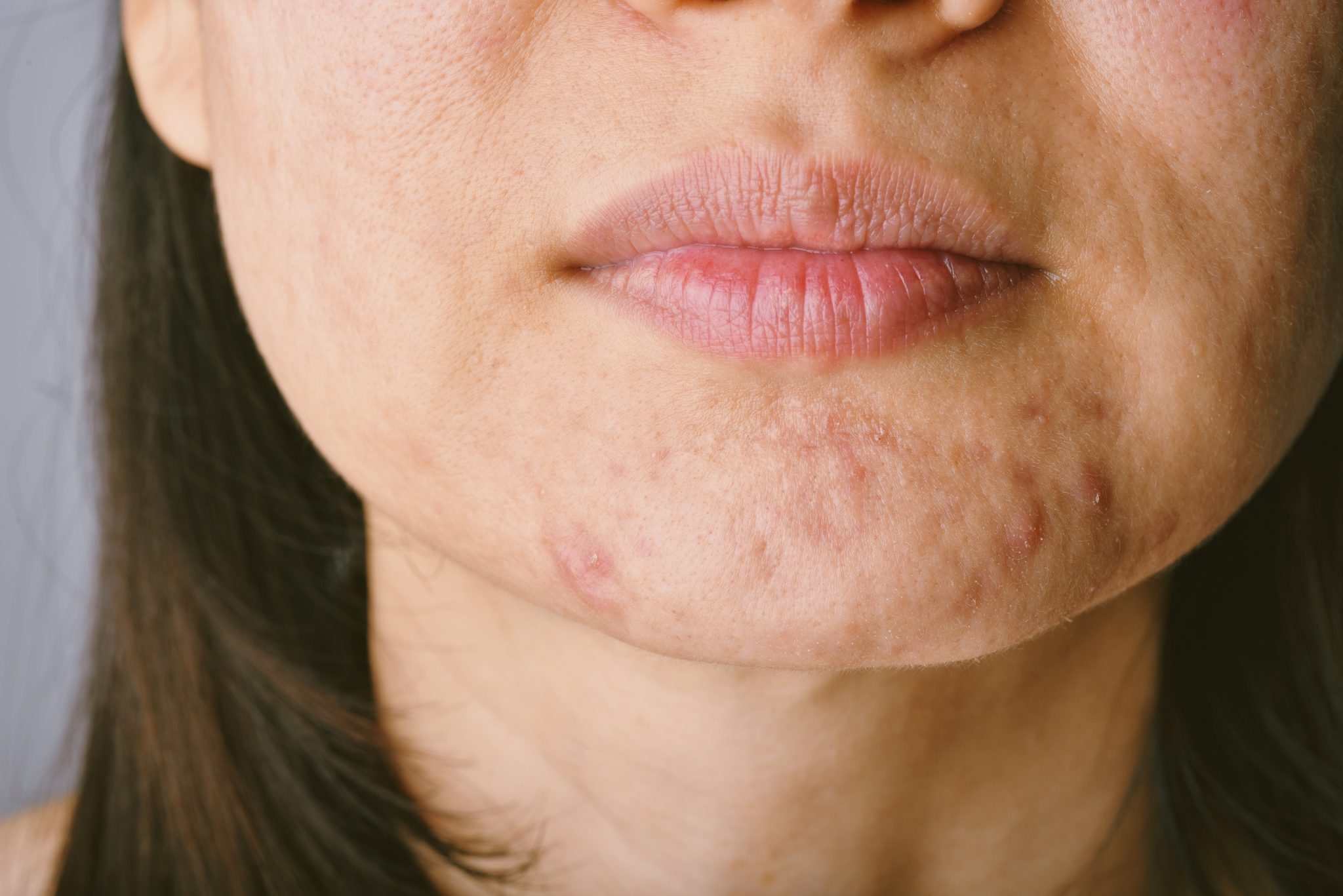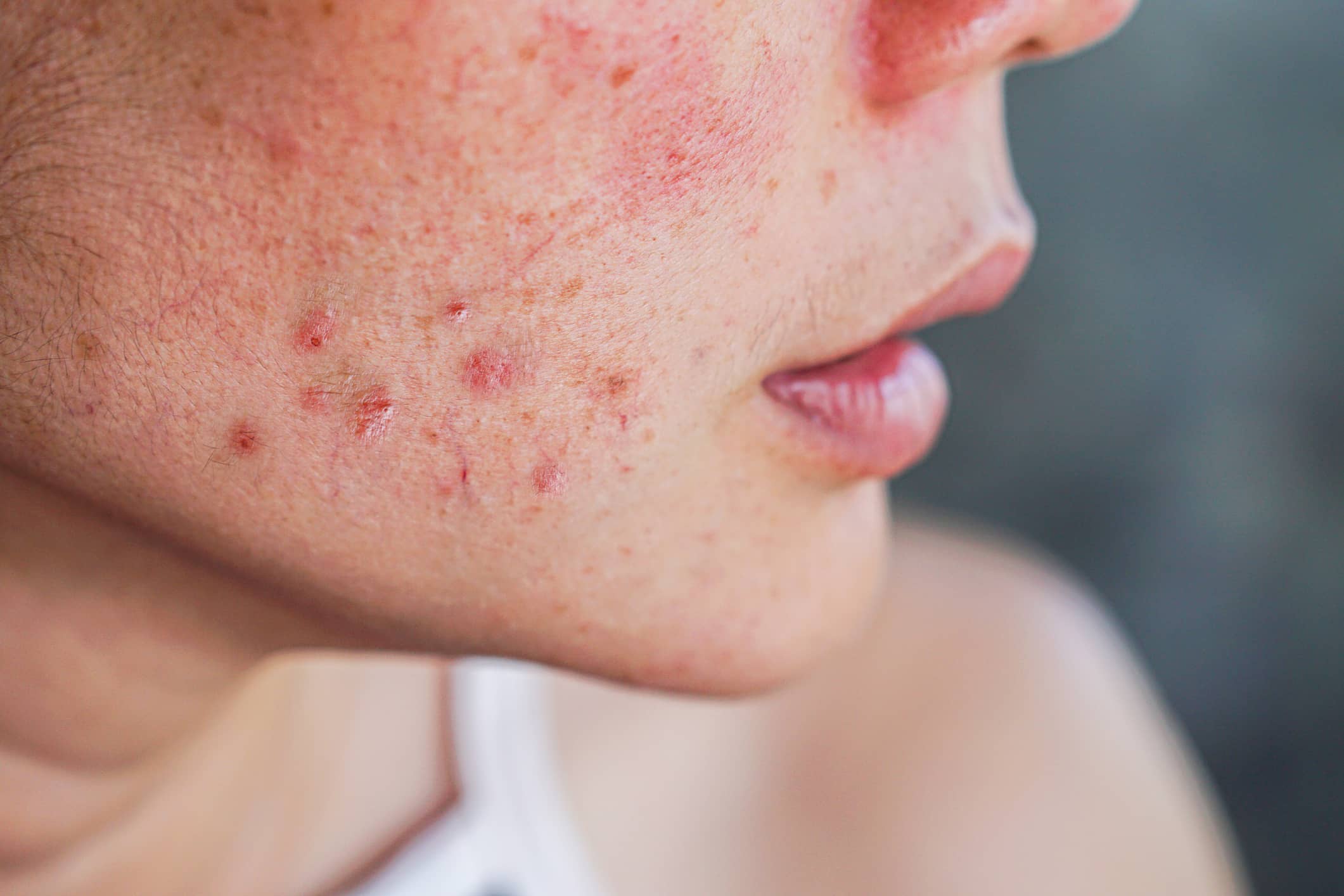Menopausal Acne: Causes, Treatment & Expert Tips You Need To Know!
Is your skin staging a rebellion just as you thought you'd outgrown breakouts? It's a cruel twist, but you're not alone: menopausal acne is a real, frustrating phenomenon, and understanding it is the first step to reclaiming your complexion.
Menopausal acne, often a type of hormonal acne, surfaces when individuals assigned female at birth undergo the transition of menopause. This unwelcome guest can manifest in various forms, from deep, cystic acne to inflamed whiteheads, leaving many feeling like they're reliving their teenage years. But unlike the acne of adolescence, this adult version can feel different, more persistent, and frankly, more insulting. The hormonal fluctuations that accompany menopause are the primary culprit, and while those hormonal shifts are inevitable, the acne that sometimes follows doesn't have to be a life sentence. According to experts like Rodney, there are ways to manage and mitigate its effects.
Menopause throws a lot at a woman's body, and menopausal acne is one of those curveballs that often catches people off guard. Its a conversation that isn't had enough, leaving many in the dark when their skin starts behaving erratically, presenting with rashes, acne, rosacea, or just general pimples. What's truly going on? It boils down to a natural and normal shift in hormones. However, its important to recognize that other underlying conditions and disorders can also contribute to acne breakouts in women during their 40s and 50s. These include insulin resistance, thyroid abnormalities, polycystic ovary syndrome (PCOS), and hyperprolactinemia. So, while hormonal imbalance is the major factor, it's not the only one to consider.
- Potomac River Plane Crash Photos Victims Amp Details Emerge
- Adrianne Palicki Hot Photos More The Ultimate Guide
According to Dr. Anastasia Therianou, a consultant dermatologist, The etiology of menopausal acne is multifactorial, with hormonal imbalance being the major culprit. As estrogen levels decrease during menopause, male hormone levels (androgens) remain relatively stable, which can lead to an imbalance that triggers acne. But can this type of acne strike even if you've never experienced it before? Yes, hormonal fluctuations during menopause can trigger acne for the first time, even in women without a history of skin issues. The unfairness of it all!
Many women wonder if hormone replacement therapy (HRT) could be to blame. The answer is a qualified yes. Certain HRT formulations containing progestin may contribute to breakouts by affecting hormone levels. So, while HRT can alleviate other menopausal symptoms, it may inadvertently exacerbate acne in some individuals. It's a delicate balancing act that requires careful consideration and discussion with your healthcare provider.
The good news is that menopausal acne is generally temporary, and skin should calm down once postmenopausal hormone levels recalibrate. Patience is key, along with consistent adherence to recommended treatments and prevention techniques. However, for many, acne continues well into adulthood, declining only gradually with age. Roughly a quarter of women in their 40s and about 15% of women in their 50s experience acne regularly, sometimes leading to the specific type we call menopausal acne. It's simply acne that occurs around the time of menopause when your hormone levels are in flux.
- Decoding The Cant Believe This My Life Lebron Smiling Meme Explained
- Stunning Black Women Images Find Inspiration Beauty Now
If your skin is acting up as you approach menopause, it's likely due to hormonal changes that can lead to increased oil production, and subsequently, acne. This can be incredibly frustrating, especially if you thought those blemish-battling days were behind you. Menopausal acne is precisely what it sounds like: an increase in acne appearing on the skin before and during menopause. Hormone levels fluctuate in the years leading up to menopause before tapering off and decreasing at a steadier pace. As estrogen production diminishes, dry skin, and at times, itchiness, becomes very common, often compounding the problem.
Dr. Perkins notes that Acne from menopause may present in the lower face, particularly the chin and jawline." These breakouts "can be severe and may hang around longer, as the hormones responsible for their presence increase throughout the postmenopausal years. Menopausal acne often appears as deep, inflamed lesions. Furthermore, rashes, rosacea, and acne all qualify as menopausal symptoms, emphasizing the broad range of skin-related issues that can arise during this transition.
Menopausal acne typically flares up on the lower half of the face, with the chin, jawline, and neck being the most common areas. While some women experience blackheads or whiteheads, cystic acne is particularly prevalent. Some women exhibit heightened sensitivity to this type of acne after menopause, and this distribution pattern is commonly observed among women with postmenopausal acne. It's similar to acne that might appear at other points in life, and when a breakout occurs, the surrounding skin may also turn red.
Menopausal acne occurs as a result of hormonal changes and can be notoriously difficult to treat. Experts offer their best tips for managing mature skin, emphasizing that menopause is a time of fundamental change and requires a tailored approach. Treating it involves a combination of targeted skincare, lifestyle adjustments, and, in some cases, medical intervention. These medical treatments can provide targeted solutions to address the underlying hormonal changes and specific skin concerns.
Beyond hormonal fluctuations, other factors can exacerbate or trigger acne during menopause. These include stress, diet, and certain medications. Stress, in particular, can wreak havoc on hormone levels, leading to increased oil production and inflammation, both of which contribute to acne. A diet high in processed foods and sugar can also trigger breakouts, as these foods can cause spikes in insulin levels, further disrupting hormone balance. Certain medications, such as corticosteroids and some antidepressants, can also have acne as a side effect.
Effective strategies for managing menopausal acne encompass a multifaceted approach. This includes understanding how hormonal changes during perimenopause can trigger acne, implementing appropriate skincare routines, making supportive lifestyle changes, and considering medical interventions for clearer and more radiant skin.
Skincare Routine Essentials: When tackling menopausal acne, the right skincare routine can make all the difference. Start with a gentle cleanser to remove dirt, oil, and makeup without stripping the skin's natural moisture barrier. Look for cleansers containing salicylic acid or benzoyl peroxide, which can help unclog pores and reduce inflammation. Follow up with a toner to balance the skin's pH and prepare it for subsequent products.
Targeted Treatments: Incorporate targeted treatments like retinoids or topical antibiotics to address specific acne concerns. Retinoids, such as tretinoin or adapalene, can help increase cell turnover and prevent pores from becoming clogged. Topical antibiotics, like clindamycin or erythromycin, can help reduce inflammation and kill acne-causing bacteria. However, it's essential to use these products as directed by a dermatologist, as overuse can lead to dryness and irritation.
Moisturize and Protect: Don't skip moisturizer, even if you have oily skin. Menopause can cause dryness, which can exacerbate acne. Choose a lightweight, non-comedogenic moisturizer to hydrate the skin without clogging pores. Finish your routine with a broad-spectrum sunscreen with an SPF of 30 or higher to protect your skin from sun damage.
Lifestyle Adjustments: In addition to skincare, lifestyle adjustments can significantly impact menopausal acne. A balanced diet rich in fruits, vegetables, and whole grains can help regulate hormone levels and reduce inflammation. Limit your intake of processed foods, sugary drinks, and dairy products, as these can trigger breakouts.
Stress Management: Stress management techniques, such as yoga, meditation, or deep breathing exercises, can help lower cortisol levels and reduce acne. Regular exercise can also improve hormone balance and reduce stress. Aim for at least 30 minutes of moderate-intensity exercise most days of the week.
Consider Medical Interventions: If skincare and lifestyle changes aren't enough, medical interventions may be necessary. A dermatologist can prescribe stronger topical or oral medications to treat acne. Oral contraceptives can help regulate hormone levels and reduce breakouts, while spironolactone can block androgen hormones that contribute to acne.
Laser and Light Therapies: Laser and light therapies can also be effective in treating menopausal acne. Blue light therapy can kill acne-causing bacteria, while red light therapy can reduce inflammation and promote healing. Chemical peels can exfoliate the skin and unclog pores, while microdermabrasion can remove dead skin cells and improve skin texture.
Alternative Therapies: Some women find relief from menopausal acne through alternative therapies. Acupuncture, herbal remedies, and dietary supplements may help balance hormone levels and reduce inflammation. However, it's essential to talk to a healthcare provider before trying any alternative therapies, as some may interact with medications or have side effects.
Patience and Persistence: It's crucial to remember that treating menopausal acne takes time and patience. It may take several weeks or months to see significant improvement. Be consistent with your skincare routine, lifestyle changes, and medical treatments. Don't get discouraged if you experience setbacks or flare-ups. With the right approach, you can effectively manage menopausal acne and achieve clearer, healthier skin. Remember, you're not alone in this journey, and there are resources and support available to help you navigate this challenging time.
When it comes to specific products to use, look for those containing ingredients like salicylic acid, benzoyl peroxide, retinoids, and azelaic acid. Salicylic acid helps to exfoliate the skin and unclog pores, while benzoyl peroxide kills acne-causing bacteria. Retinoids increase cell turnover and prevent pores from becoming clogged, and azelaic acid reduces inflammation and hyperpigmentation. However, it's essential to introduce these products gradually to avoid irritating the skin. Start with a low concentration and increase as tolerated.
Don't forget the importance of gentle cleansing. Over-washing or using harsh cleansers can strip the skin of its natural oils, leading to dryness and irritation, which can, paradoxically, worsen acne. Choose a mild, non-comedogenic cleanser and wash your face twice a day once in the morning and once at night. Pat your skin dry with a soft towel and avoid rubbing or scrubbing, as this can further irritate the skin.
One often-overlooked aspect of managing menopausal acne is hydration. As estrogen levels decline during menopause, the skin tends to become drier and more sensitive. Drinking plenty of water can help to keep the skin hydrated from the inside out. Aim for at least eight glasses of water a day, and consider using a humidifier to add moisture to the air, especially during the winter months. A well-hydrated skin barrier is better equipped to withstand the effects of acne-causing factors.
And finally, resist the urge to pick or squeeze pimples. While it may be tempting, picking or squeezing can lead to inflammation, scarring, and further breakouts. Instead, use a spot treatment containing salicylic acid or benzoyl peroxide to target individual pimples. Cover the affected area with a hydrocolloid bandage to protect it from further irritation and promote healing.
Dealing with menopausal acne can be a frustrating and disheartening experience. However, by understanding the underlying causes and implementing effective management strategies, you can regain control over your skin and improve your overall well-being. Remember, you're not alone in this journey, and there are resources and support available to help you navigate this challenging time. Talk to your healthcare provider or dermatologist to develop a personalized treatment plan that addresses your specific needs and concerns. With patience, persistence, and the right approach, you can achieve clearer, healthier skin and embrace this new chapter with confidence.
| Strategy | Description | Key Actions |
|---|---|---|
| Skincare Routine | Gentle cleansing, targeted treatments, moisturization, and sun protection |
|
| Lifestyle Adjustments | Balanced diet, stress management, and regular exercise |
|
| Medical Interventions | Topical or oral medications, laser and light therapies, chemical peels |
|
| Alternative Therapies | Acupuncture, herbal remedies, and dietary supplements |
|
- Decoding The Cant Believe This My Life Lebron Smiling Meme Explained
- Josh Shapiro Pa Governor Family Career What You Need To Know

6 Ways To Manage Acne During Menopause Women's Health and Menopause

Menopausal Acne Best Treatments According to Dermatologists MDacne

Menopause acne causes and treatment